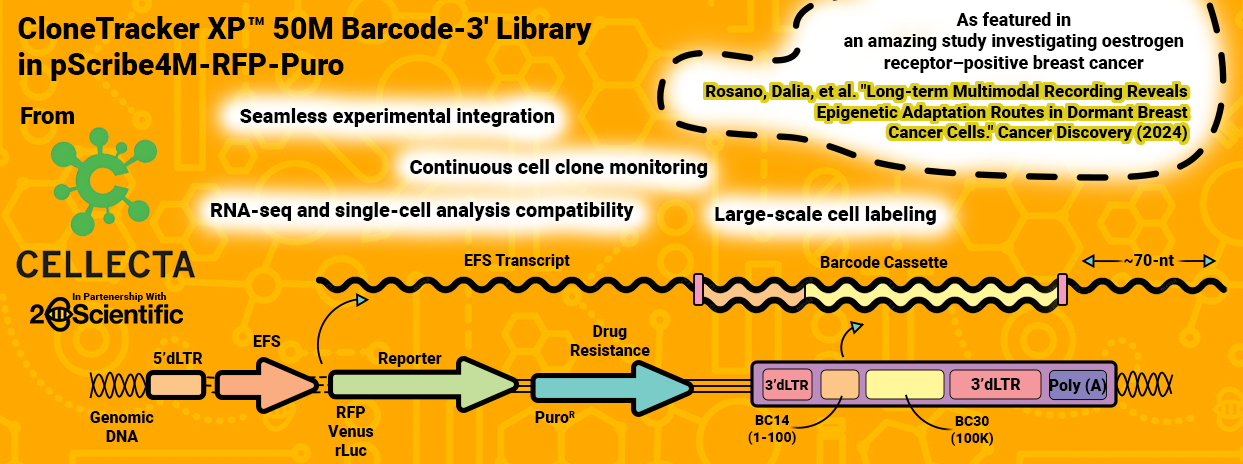Long-term Multimodal Recording Reveals Epigenetic Adaptation Routes in Dormant Breast Cancer Cells
Article: https://pubmed.ncbi.nlm.nih.gov/38527495/
This study investigated why some patients with oestrogen receptor-positive breast cancer relapse even after treatment with endocrine therapies (ET). Despite these treatments delaying relapse by targeting small cancer deposits, up to half of patients still relapse, often years later, due to unknown mechanisms. Researchers studied late relapse patients and a rare group treated with ETs until progression.
Cellecta’s CloneTracker XP™ 50M Barcode-3' Library in pScribe4M-RFP-Puro was selected for its unique advantages in the study including:
- Continuous cell clone monitoring: Track cell activity during drug treatment, differentiation, or tumorigenesis.
- Large-scale cell labelling: Over a million cells labelled with unique barcodes from a 50M barcode library.
- RNA-seq and single-cell analysis compatibility: Barcodes expressed in RNA easily detected for comprehensive analysis.
- Seamless experimental integration: Barcodes integrated into 3'-UTR compatible with oligo-dT cDNA synthesis.
- Barcode heritability: Ensured maintenance of unique barcodes through cell proliferation for accurate lineage tracking.
This technique facilitates understanding which lineages survive and how they adapt, providing valuable results that contribute to understanding development of resistance to endocrine therapies. Overall, the CloneTracker XP™ 50M Barcode-3' Library in pScribe4M-RFP-Puro contributes significantly to interpreting the role of genetic and epigenetic changes in cancer cell adaptation and resistance and worked as an invaluable tool for this study. Using these laboratory techniques, they found that ETs can push some cancer cells into a dormant state through changes in gene activity, and these cells can wake up without genetic changes. Targeting these dormant cells' gene activity shows promise as a treatment strategy.
Research was carried out with a range of different approaches where a plethora of different Antibody, Assay Kits, Cells, PCR Probes and Primers, Culture Media were all used to garner accurate results. 2BScientific have over a million accurate and reliable life science reagents to empower researchers looking to investigate a multitude of fields including the aforementioned study. Our friendly team at 2BScientific guarantees fast service and 100% product satisfaction, make sure to get in contact at sales@2bscientific.com with any queries about our products, or anything concerning life science reagents!
2BScientific and Cellecta will be attending the AACR Annual Meeting 2024 held by The American Association for Cancer Research between 7-10th of April where we will be conversing our impressive product ranges, amazing suppliers and cutting-edge reagents.

